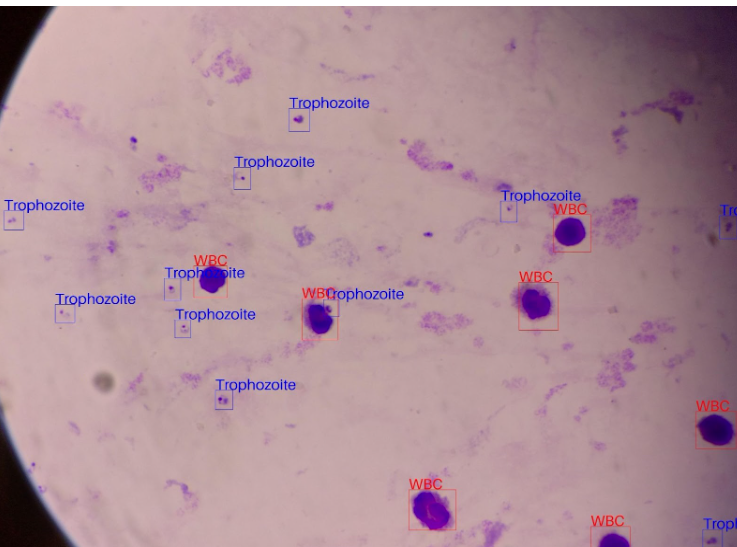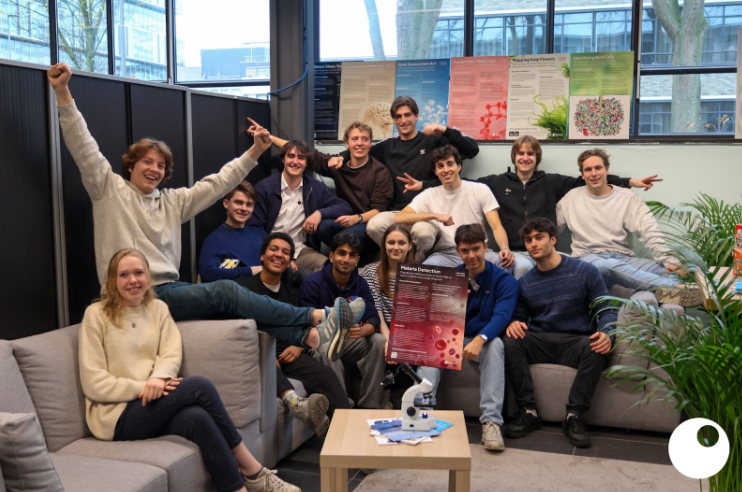The team was evaluating several object detection models, taking into account the varying image resolutions and other relevant factors in the dataset. The primary challenge was to develop a model capable of effectively generalizing across these diverse conditions. The image displayed represents a blood sample. Using this data, an AI model is trained to accurately detect and identify trophozoites and white blood cells through the use of bounding boxes. By analyzing the detected trophozoites and white blood cells, conclusions can be drawn regarding the severity of the malaria infection in the sample.
UN Sustainable Development Goals
‘’This competition aligns with the UN Sustainable Development Goal #3: Good Health and Well-Being. By advancing early-stage malaria detection, we aim to enable timely and accurate diagnoses, particularly in underserved regions, improving access to quality healthcare.’’
Extensive Computing power for Model training
Our partnership with Epoch is built on shared values and a common vision for the future of artificial intelligence. We share the belief that machine learning and artificial intelligence should be used to create smarter, more intuitive systems capable of understanding and interacting with the world in new and unprecedented ways. Together, we are committed to enhancing the capabilities of AI to make it more available, reliable, and efficient across numerous industries and applications.
”Thanks to Nebul, we can test and run our AI models much faster and, as a result, work more productively than our competitors. With Nebul’s computer clusters, we have access to all the infrastructure needed to improve our AI models.”
The final and winning submission was developed using an ensemble approach, combining YOLO models and detection transformers (DETR). The YOLO models were trained for 100 epochs, while the DETR models underwent 60 epochs of training. These models were fine-tuned entirely on Nebul’s computing systems.
Team Epoch executed their models on Nebul’s DGX Supercomputer, utilizing an array of NVLink connected H100 GPUs. The NVIDIA DGX is the world’s fastest commercial off-the-shelf supercomputing platform, connected with Infiniband and parallel storage filesystems to ensure maximum throughput delivery.
About Epoch
Team Epoch is the Artificial Intelligence Dream Team from TU Delft. They are a student team who uses AI to tackle global challenges like climate change, healthcare, renewable energy and for example educational problems.
Through international competitions and research, they develop practical AI solutions. Winning is what they aim for, but the main goal is to use these competitions and research projects to drive innovation for real-world impact. All these competitions and projects need to comply with the United sustainable development goals.
Epoch also works to inspire others by sharing knowledge and raising awareness about AI. Their mission is to make AI more accessible and to show its potential for building a better, more sustainable future.
About Nebul
Nebul’s European Private & Sovereign AI Cloud provides world-class AI supercomputing and GPU accelerated business computing services while ensuring EU data sovereignty, privacy and compliance. One of the services, PrivateGPT is the European compliant alternative to ChatGPT, built for European organizations who want to allow their teams to use AI, connected to their data, safely and securely, with better quality and accuracy than ChatGPT.
As an official NVIDIA Elite Cloud Service Provider, DGX Cloud Partner and DGX Solution Provider, Nebul enables European organizations to navigate the complexities of deploying supercomputing and GPU workloads on private cloud, hybrid, and multi-cloud environments.
Nebul offers NVIDIA platforms such as DGX, HGX, OVX and RTX with enterprise class GPUs including B200, H200, H100, L40s and L4, designed for graphics/rendering, digital twins, modeltraining and inference at any scale. The company leverages efficient green energy data centers, with our various Supercomputing and GPU centers located strategically across the European Continent.
Press Contact Information
For media inquiries, product offering, or more information about our partnership, please
contact us at:
➔ www.nebul.com | +31(0)88 2040 300
➔ www.teamepoch.ai | +31(0)6 195 647 16




